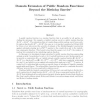107 search results - page 4 / 22 » When Random Play is Optimal Against an Adversary |
GECCO
2007
Springer
14 years 1 months ago
2007
Springer
Opponent models are necessary in games where the game state is only partially known to the player, since the player must infer the state of the game based on the opponent’s acti...
CRYPTO
2007
Springer
14 years 1 months ago
2007
Springer
A public random function is a random function that is accessible by all parties, including the adversary. For example, a (public) random oracle is a public random function {0, 1}â...
CRYPTO
2004
Springer
14 years 26 days ago
2004
Springer
A timestamping scheme is non-interactive if a stamper can stamp a document without communicating with any other player. The only communication done is at validation time. Non-Inte...
AAAI
2006
13 years 8 months ago
2006
Many learning tasks in adversarial domains tend to be highly dependent on the opponent. Predefined strategies optimized for play against a specific opponent are not likely to succ...
INFOCOM
2012
IEEE
11 years 10 months ago
2012
IEEE
—Distributed systems without trusted identities are particularly vulnerable to sybil attacks, where an adversary creates multiple bogus identities to compromise the running of th...

